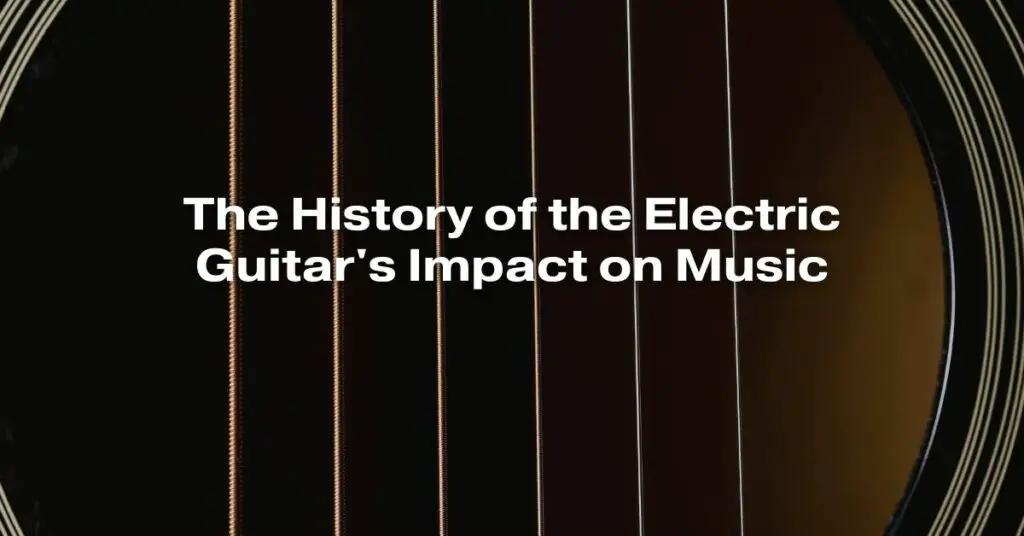The electric guitar stands as a true icon of the musical world, its electrifying presence shaping the sound of various music genres and revolutionizing the way musicians create and perform. From its humble beginnings to becoming a cornerstone of modern music, the electric guitar’s journey is as fascinating as the notes it produces. In this article, we delve into the rich history of the electric guitar, exploring its evolution and its profound impact on the music industry.
The Birth of the Electric Guitar
The concept of the electric guitar dates back to the early 20th century. In the 1920s, jazz musicians and big band performers sought ways to amplify their sound in noisy venues. This led to the invention of the first commercially successful electric guitar by George Beauchamp and Adolph Rickenbacker in 1931. This pioneering instrument, known as the “Frying Pan,” featured a magnetic pickup that converted string vibrations into electrical signals, making it the first true electric guitar.
The Rise of Rock ‘n’ Roll
The post-World War II era saw the rise of rock ‘n’ roll, a genre that would change the face of music forever. Innovators like Chuck Berry, Bo Diddley, and Elvis Presley embraced the electric guitar, infusing their energetic performances with electrifying riffs and solos. The iconic guitar licks in songs like “Johnny B. Goode” became synonymous with the rebellious spirit of rock ‘n’ roll, captivating audiences around the world and inspiring countless aspiring musicians.
The Golden Era of Guitar Innovation
The 1950s and 1960s marked a golden era of guitar innovation, with legendary companies like Fender, Gibson, and Gretsch leading the way. Fender introduced the Stratocaster in 1954, featuring a contoured body, three pickups, and a vibrato system, setting new standards for versatility and playability. Gibson, on the other hand, launched the Les Paul model in 1952, showcasing a solid body and powerful humbucking pickups, which eliminated unwanted noise and provided a thicker, warmer tone. These innovations revolutionized the sound of popular music, making the electric guitar an indispensable instrument in various genres, from blues and jazz to rock and beyond.
The Psychedelic Era and Guitar Heroes
The 1960s psychedelic era ushered in a wave of experimental music, with artists like Jimi Hendrix, Eric Clapton, and Jeff Beck pushing the boundaries of guitar playing. Hendrix, in particular, became an emblematic figure, showcasing unprecedented techniques and effects that expanded the guitar’s sonic possibilities. His iconic performance at Woodstock in 1969, highlighted by his rendition of “The Star-Spangled Banner,” remains etched in the annals of music history, demonstrating the electric guitar’s power to convey emotion and political messages.
The Evolution of Heavy Metal and Shredding
In the 1970s and 1980s, the electric guitar found a new home in the realm of heavy metal. Bands like Black Sabbath, Led Zeppelin, and Metallica brought forth a heavier, more aggressive sound, characterized by distorted tones and blistering guitar solos. Additionally, the emergence of guitar virtuosos like Eddie Van Halen and Yngwie Malmsteen popularized the art of shredding, showcasing lightning-fast techniques and unparalleled precision. These developments solidified the electric guitar’s status as the quintessential instrument for expressing raw power and technical prowess.
The Digital Age and Beyond
The digital age ushered in a new era of possibilities for the electric guitar. Advancements in technology led to the development of digital effects processors, modeling amps, and software plugins, enabling guitarists to explore an infinite array of tones and effects. This digital revolution democratized access to professional-quality sound, empowering musicians of all levels to experiment and create in ways previously unimaginable.
Conclusion
The electric guitar’s journey through history is a testament to its enduring influence on music. From its early days as a tool for amplification to its central role in shaping diverse genres like rock, blues, jazz, and metal, the electric guitar has left an indelible mark on the musical landscape. As we continue into the 21st century and beyond, the electric guitar remains a source of inspiration, innovation, and endless sonic exploration, ensuring its legacy as an iconic instrument that will continue to shape the future of music.


